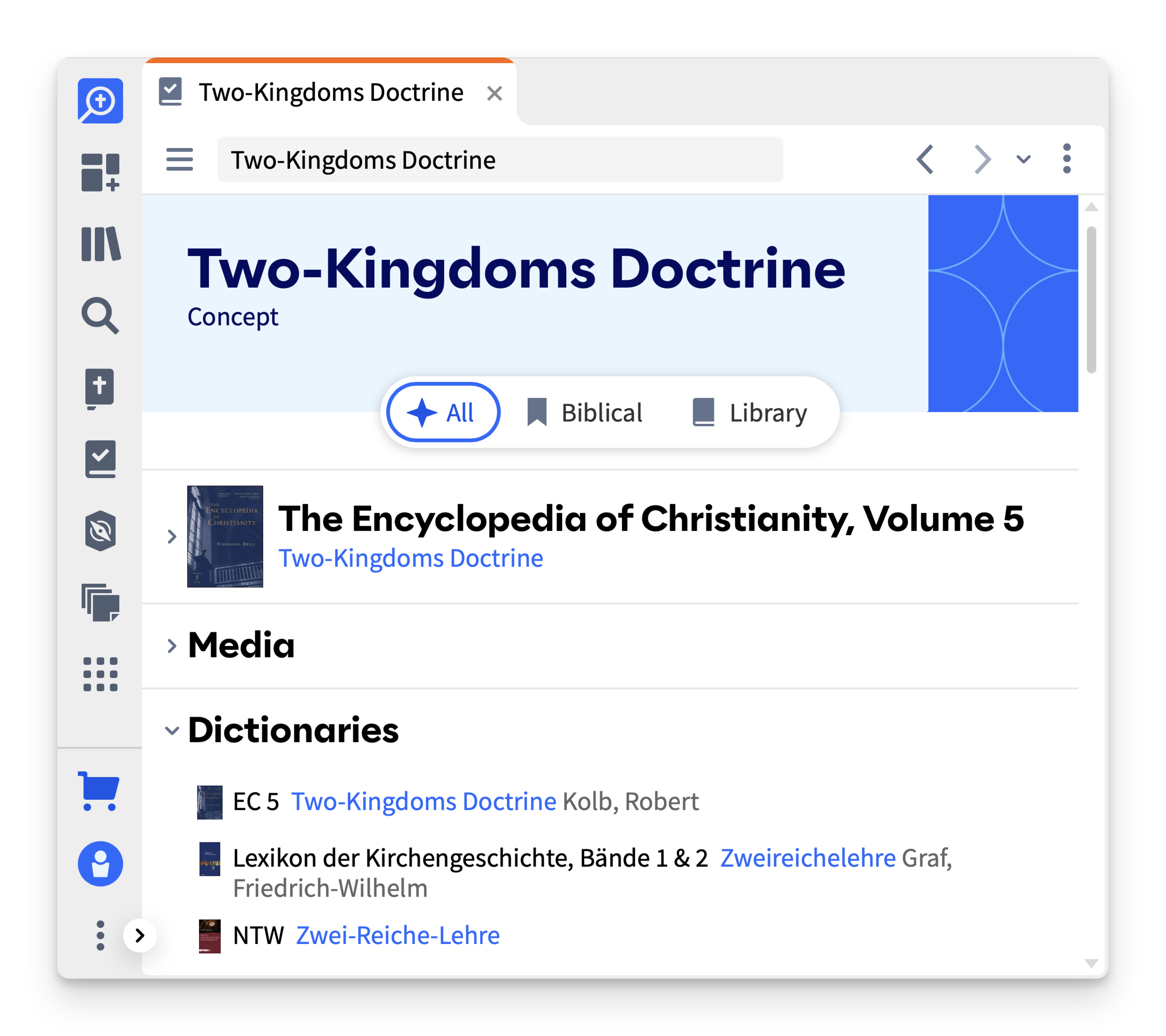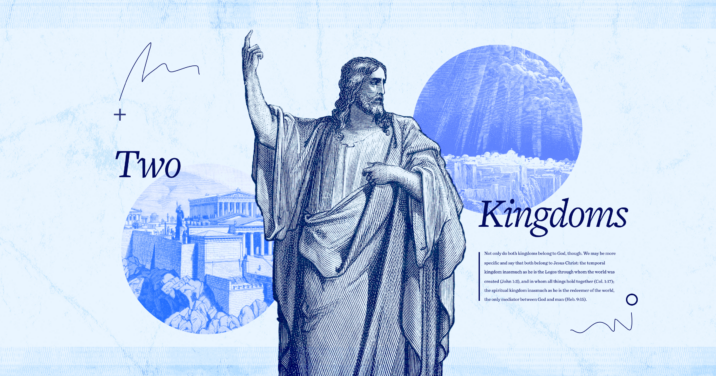Editor’s note: The articles in our political theology series are the opinions of the authors, not those of Logos. We are publishing a breadth of voices to reflect varying perspectives within the church.
“My kingdom is not of this world,” declares Jesus. In one of the most memorable conversations in all of Scripture, addressing the representative of what was then the most powerful kingdom on earth, the Roman Empire, he continues, “If my kingdom were of this world, my servants would have been fighting, that I might not be delivered over to the Jews” (John 18:36 ESV).
If this is all we had to go on, we might be tempted toward a kind of gnostic spiritualism, imagining Christ’s kingdom as something so invisible and otherworldly that it serves only to offer us an escape from this world’s darkness and violence. And yet elsewhere Christ tells us “the kingdom of God is in the midst of you” (Luke 17:21 ESV) and describes its growth within the world as leaven, suffusing the whole dough, or like a tiny mustard seed, growing into a great tree in which the birds can nest (Matt 13:31–32). Scripture tells us, moreover, that even if Christ’s kingdom is “not of this world,” the kingdoms of this world will become part of it (Rev 11:15), the nations will be his possession (Ps 2:8), and “the kings of the earth will bring their glory into it” (Rev 21:24).
Clearly, although Christ’s kingdom may not be this-worldly, neither is it strictly otherworldly: it takes root here and now, and makes claims upon earthly rulers. As I seek to show in this article, the doctrine of the two kingdoms provides a valuable framework for making sense of both the unity and duality of Christ’s reign.
The two kingdoms as historically developed
Christian theology has always sought to do justice to this duality in some way or another. Augustine’s famous doctrine of the two cities warned against any effort to try and find Christ’s spiritual reign within the fumbling and crumbling rule of the later Christian emperors of Rome, while also stressing that the city of God was not a purely future reality, but took shape within history in the community of the church. A few decades later, Pope Gelasius articulated what became known as the two swords doctrine, claiming that, whereas bishops governed through the spiritual sword of God’s Word, kings governed through the temporal sword of earthly rewards and punishments.
Although Christ’s kingdom may not be this-worldly, neither is it strictly otherworldly.
The so-called “two kingdoms” doctrine overlaps in certain ways with these earlier paradigms, but also represents a distinctive Reformational approach to the problem, anchored in Protestant convictions about the nature of salvation and the role of the church. The doctrine is usually attributed to Martin Luther, who frequently used the language of zwei Reiche (two kingdoms) and zwei Regimente (two governments) throughout his writings of the 1520s and 1530s: the one “worldly,” “temporal,” or “civil”; the other “spiritual.” Calvin too structures his famous Institutes explicitly in terms of the doctrine, declaring in a key passage at the end of Book III,
The former has its seat within the soul, the latter only regulates the external conduct. We may call the one the spiritual, the other the civil kingdom. Now, these two, as we have divided them, are always to be viewed apart from each other. When the one is considered, we should call off our minds, and not allow them to think of the other. For there exists in man a kind of two worlds, over which different kings and different laws can preside.1
Not all of the Reformers used exactly the same language or emphasized the two kingdoms in the same way. But nearly all worked within its basic logic, and some, such as Philipp Melanchthon or Peter Martyr Vermigli often drew upon it in debates on ecclesiology, Christian liberty, or political theology. It would also play an important role in conflicts between so-called “puritans” and “Anglican” conformists in the early Church of England.
As the quotation from Calvin suggests, however, we should not think of the two kingdoms doctrine as chiefly a matter of Christian political thought, used to divvy up the respective tasks of church and state. It certainly has implications for that question, as we shall see, but it is far broader and more fundamental. Indeed, the language of “two kingdoms,” which has become standard in both scholarly and popular treatments, is perhaps unhelpful or misleading, suggesting as it does two rival domains within earthly life. This doctrine has also been characterized as a doctrine of two ages—highlighting its eschatological function in distinguishing between this present life and the life to come—or as a doctrine of two realms—highlighting the two different planes of existence within which the Christian life is lived, one hidden and spiritual, the other visible and earthly.
Perhaps the best language, though, and that which Luther himself preferred, was that of the two governments. This highlights the dynamic character of the doctrine as a paradigm for understanding the two very different, yet complementary, ways in which Jesus Christ exercises his rule over the world, and over Christians within it.
- Through one, he upholds and sustains the created order which, even in its fallen state, reflects God’s glory and offers a fitting habitat for his image-bearers.
- Through the other, he redeems his people from their state of alienation and spiritual death, and transforms them into emissaries of his rule, able to act within the temporal kingdom in ways that more nearly reflect God’s original will for creation.
The doctrine should thus help us think of two different modes of Christian life in the world, not two different spheres, as the life of the institutional church itself has aspects of each, as we shall see.
Two kingdoms ruled by one king
We must emphasize at the outset that the two kingdoms (I will defer to the common terminology, despite its limitations) are both under God. It would be out of question to use this doctrine to secularize the affairs of this world in the sense of making them totally neutral and non-religious, as if they could be carried on properly with entire disregard to their Creator.
In distinguishing the two kingdoms, then, we must both begin and end with their unity. They find their initial unity in the one triune God who has ordered all things for his glory, and rules over all things through both his secret and his revealed will. His revealed will is made apparent both in nature itself (natural law) and in Scripture. The two kingdoms then find their ultimate unity in the consummation of all things under God’s rule at the last day.
Not only do both kingdoms belong to God, though. We may be more specific and say that both belong to Jesus Christ: the temporal kingdom inasmuch as he is the Logos through whom the world was created (John 1:3), and in whom all things hold together (Col 1:17); the spiritual kingdom inasmuch as he is the redeemer of the world, the only mediator between God and man (Heb 9:15). Moreover, his spiritual reign as redeemer has implications for the temporal order as well, as the kings of the earth are compelled to recognize their subordination to the ascended Christ (Ps 2:1–12). Both Old and New Testaments are consistent in testifying that as Messiah, the anointed one, Jesus has received a crown above all crowns, reigning as king over earthly kings.
While divided now, the two kingdoms will ultimately be united in one reign at the last day.
Different eschatologies may disagree as to exactly when and how these prophecies are fulfilled. Nonetheless, we can safely generalize that, by virtue of his ascension, Jesus has in some sense already been enthroned as universal king (Phil 2:9–11), but that this will not be manifest until the consummation. At that point, Christ “delivers the kingdom to God the Father after destroying every rule and every authority and power. For he must reign until he has put all his enemies under his feet” (1 Cor 15:24–25 ESV). Thus we can say that, while divided now, the two kingdoms will ultimately be united in one reign at the last day.
Two kingdoms for two different purposes
Perhaps the most important distinction between the two kingdoms relates to their ends or purposes.
Through his temporal reign, Christ preserves and maintains the created order according to the laws prescribed for it in in the beginning. After the fall, this created order is marred but not altogether lost. Although human beings have become desperately wicked, God promises in Genesis 9 never again to bring a catastrophic judgment on all humanity until the end of the age (2 Pet 3:5–7). In the meantime, men and women continue to do ordinary human activities like marrying, raising children, organizing societies, farming and innovating, and seeking knowledge of their world. Indeed, albeit in a hopelessly fallen way, they still from time to time succeed in carrying out fragments of God’s original purpose for humankind (Gen 1:26–28). Over all this, God providentially reigns. By his common grace he restrains sin from coming to its fullest expression.
However, this is obviously not enough. God intends to restore humanity to harmony with one another and with himself. Accordingly in Genesis 3 he had promised that a savior will come, a promise progressively elaborated through his covenants with Abraham, Moses, and David. Already within the Old Testament, God begins to establish the spiritual kingdom with the purpose of redeeming a people for himself. After the coming of Christ, this redemptive kingdom becomes manifest in the life of believers and is identified with the church—albeit the hidden spiritual reality of the church not visible to human eyes.
Although not all two kingdoms theologians use the categories of covenant theology, the two discourses can help illuminate each other. God administers the temporal kingdom through the Noahic Covenant, promising to preserve the world and outwardly restrain evil through agencies like civil government (often seen to be implied in the statement in Gen 9:6: “Whoever sheds the blood of man, by man shall his blood be shed” ESV). The spiritual kingdom, however, is administered through the covenant of redemption in its various phases from Abraham to Christ.
It should be noted also that the two kingdoms have different memberships. All of humanity lies under Christ’s temporal kingdom—which is for this reason often called the “common kingdom,” including duties and blessings common to all people, saved and unsaved. As Matthew 5:45 says, “For he [God] makes his sun rise on the evil and on the good, and sends rain on the just and on the unjust” (ESV). Believers alone are members of the spiritual kingdom, which means that they have a dual citizenship as both citizens of particularly earthly portions of the temporal kingdom (Acts 22:25–28) and as citizens of the heavenly kingdom (Phil 3:20).

Use Logos’s Factbook to study theological concepts like the two kingdoms doctrine.
Two kingdoms governed by two different laws
Because they are ordered toward different ends, the two kingdoms are regulated by different laws.
In traditional two kingdoms theology, natural law (or moral law) is the rule by which God governs the temporal or common kingdom. That is to say, the standard for all mankind, saved or unsaved, continues to be the basic moral order inscribed upon human nature by creation, and inscribed on human hearts through the testimony of conscience (Rom 1:19–20, 2:14–15). This law is not a matter of autonomous reason, but is our participation in the Logos through the logoi (rational principles) that he has implanted in us. The Ten Commandments are generally taken to be a kind of summary of this law, with the first table spelling out our basic moral duties toward God that we have by virtue of creation (Exod 20:2–11), and the second table our basic duties toward one another (Exod 20:12–17).
Civil government is charged with upholding this natural law, specifying it in appropriate human laws for each particular time and place, and enforcing it as appropriate through outward punishment. Of course, because of the fall, we no longer discern natural law as we should. Indeed most cultures have become deeply corrupt in their moral habits and civil laws, especially when it comes to matters of the first table (thus the ubiquity of idolatry), although the broad outlines of the second table are still generally discerned. Modern Protestants generally depart from the older two kingdoms doctrine in suggesting that the first table should not be enforced by civil government, though the two can be reconciled if we see this as a prudential accommodation to the realities of pluralism.
Since the spiritual kingdom concerns the way of redemption made possible through divine grace alone, it must be governed by a standard that reason could never arrive at on its own. Only by revealing to us in his Word the way of salvation through faith in Christ could we ever become members in the spiritual kingdom.
Although Scripture’s primary purpose is to tell us what God has done for us and call on us to simply believe, receiving Christ’s finished work with faith, it also tells us how we are to lay hold of the means of grace and respond in thanksgiving. This includes Scripture’s teaching regarding the sacraments, guidance in how to pray, and how to conduct the spiritual life of the church. This is sometimes called supernatural law since it comes from above nature and guides us toward our supernatural end. It is solely sufficient for that end and does not need to be supplemented by any other authority.
In very simple terms, then, we might say that whereas natural law and human prudence govern the temporal kingdom, Scripture governs the spiritual kingdom. This would be too simplistic, however. For one thing, we must beware of thinking that the entire life of the church is solely the domain of the spiritual kingdom. Many of its activities are temporal in their means and ends—helpful for ordering the outward life of the church, but not essential to its salvific task (e.g., building committees, budget meetings, and fellowship groups). Most of the Reformers even put most aspects of church polity and liturgy in the temporal kingdom. As such, these things were informed by Scripture, but also by reason, prudence, and other sources of authority.
For another thing, though, Scripture is not limited to giving us supernatural law. “All Scripture is breathed out by God and profitable for teaching, for reproof, for correction, and for training in righteousness, that the man of God may be complete, equipped for every good work” (2 Tim 3:16–17 ESV). The Bible thus speaks to many matters of ordinary human life, reaffirming and clarifying the testimony of natural law which has been so distorted by the fall.
Two kingdoms administered by two different means
If the two kingdoms are ordered toward different purposes and governed by different laws, it should not surprise us that Christ also governs them by different means. The temporal kingdom is governed by the sword, the spiritual kingdom by the Word. Both of these require some explanation.
We noted above that the temporal kingdom should not simply be equated with the state or the domain of civil government. And yet, that is its highest expression. Everything from the grocery store to the grammar school to your local football team is part of the temporal kingdom, and we do not ordinarily think of these as governed by the sword. That said, they all lie under the final jurisdiction of the civil authorities.
While, in well-functioning societies, civil authorities rarely have to use the sword to settle disputes or ensure obedience, they do bear the power of life and death in the last resort, which is why Paul can write, “he does not bear the sword in vain. For he is the servant of God, who carries out God’s wrath on the wrongdoer” (Rom 13:4 ESV). More generally, then, the sword refers to any form of rule that relies ultimately on fear of external punishment, mediating God’s wrath.
The temporal kingdom is governed by the sword, the spiritual kingdom by the Word.
The Word, on the other hand, rules in the hearts of believers through the promise of divine favor, mediating God’s mercy. The Word thus refers to Scripture, but Scripture viewed from a certain perspective, not merely as a text, but as something “living and active, sharper than any two-edged sword, piercing to the division of soul and of spirit, of joints and of marrow, and discerning the thoughts and intentions of the heart” (Heb 4:12 ESV).
Luther’s distinction of law and gospel played a role here, with the law driving us through fear of punishment to God’s life-giving gospel word of promise, which rules in our hearts by faith. The spiritual kingdom, then, as an essentially hidden reality, is ruled by hidden graces bestowed by the Holy Spirit; within it, the law itself is transformed from a punishing master into a guide for how we may gratefully respond to God.
Of course, the spiritual kingdom is not entirely hidden. Although we can never know for sure who enjoys a life-giving union with Christ, the visible church is the outward symbol of the body of Christ. In it, the means of grace are bestowed through effectual outward signs: the Spirit imparts life to our hearts through the spoken words of the preacher, the cleansing waters of baptism, the bread and wine of the Lord’s Supper.
In the spiritual kingdom, then, as in the temporal, God has his ministers to act on his behalf. Yet there is an asymmetry: the ministers of the temporal kingdom (civil authorities) have discretionary authority to make binding laws; the ministers of the spiritual kingdom (pastors), however, can only proclaim what Scripture teaches. Civil authorities can enforce their commands, while pastors can only bear witness to God’s future punishments. These civil laws will also regulate, in some measure, the life of the church (even in modern America, churches are bound by fire codes and child safety laws). The visible church, then, straddles both kingdoms.
That said, it’s on this point of the church’s institutional autonomy that there have been some differences between varieties of two-kingdoms theology. Whereas Lutherans, for instance, strongly emphasized the internal character of the spiritual kingdom and argued that the external life of the church can take many different forms in different contexts, Calvinists (especially among the English and Scottish Presbyterians; Calvin himself was perhaps somewhere in the middle) argued that the spiritual kingdom too has its external laws and punishments, which civil authorities must never tamper with.
Two kingdoms in application today
Different variants of two kingdoms theology continued early modern debates over political theology. All Protestants acknowledged the need for a mutual subjection of ministers and magistrates, as ministers submitted to magistrates in affairs of the temporal kingdom, while magistrates bowed to the authority of the Word as proclaimed by the ministers. But gray areas were bound to emerge, especially in a society where nearly all citizens were baptized, and in which magistrates themselves were often devout readers of Scripture, seeking to apply it in their governing. So today, although we may have largely disentangled church and state as institutions, the boundaries of jurisdiction will still be fuzzy sometimes, as the recent pandemic showed.
Even if we have defused some conflicts of political theology by separating church and state, we would be wrong to think that we have thereby disentangled the two kingdoms. Again, these are better understood as two governments, two ways in which Christ exercises his universal rule. As such, the spiritual authority of the Word and the corrective vision is supplies for discerning the demands of justice must shape the Christian in political life. Likewise the demands of temporal existence must shape the Christian in a position of church authority as he makes financial decisions, personnel decisions, and even liturgical decisions. Each of us must find ourselves constantly negotiating our obligations to God and our neighbor under both forms of rule.
If the two kingdoms are both present at every point of the believer’s existence, one might ask what is the point of this doctrine? If “every square inch of creation” cries out Christ’s name, as Abraham Kuyper famously said, then why not just speak of one kingdom? In some ways we certainly can, inasmuch as the two share one king and will be brought together at the last day. Yet the two-kingdoms doctrine still has a deeply valuable role to play in the life of the church and the believer.
Most fundamentally, it can take the pressure off. It can remind us that while all things are Christ’s, many are destined to pass away. They may provide scaffolding for the glorious structure he is building, but they are not part of it. We can sit lightly and breathe easily in the affairs of politics, economics, and institutional life generally, recognizing that neither our salvation nor the success of Christ’s work are at stake in such things. We can keep our eyes fixed on the Word of God and the means of grace rather than placing our hope in worldly powers or our own works.
Above all, the two kingdoms doctrine can open space to be comfortable with uncertainty. By it we can distinguish between the realm in which Scripture alone tells us everything we need to know, and the realm in which God leaves us much more to our own wits, to navigate the world with wisdom—wisdom nurtured by Scripture, of course, but also by our own observation and experience of the world, such as Solomon shows us in Proverbs. Too many Protestants tend to oscillate between legalism and libertinism—either looking to the Bible as a comprehensive answer-book and turning everything into a gospel issue, or assuming that everything outside the spiritual kingdom is secular terrain where we can do as we please.
The temporal realm is a place of laws, norms, authorities, and discipline, but provisional ones—we are allowed to get it wrong sometimes. We can enjoy this freedom under authority in the temporal kingdom precisely because we know the freedom of reigning together with Christ in the spiritual kingdom. Thus, guided by the two-kingdoms doctrine, we can “live as people who are free, not using your freedom as a cover-up for evil, but living as servants of God” (1 Pet 2:16 ESV).
Enrich your understanding of two kingdoms theology
- Jonathan Beeke, Duplex Regnum Christi: Christ’s Twofold Kingdom in Reformed Theology (Brill, 2021)
- Matthew J. Tuininga, Calvin’s Political Theology and the Public Engagement of the Church: Christ’s Two Kingdoms (Cambridge University Press, 2017)
- John Witte Jr., Law and Protestantism: The Legal Teachings of the Lutheran Reformation (Cambridge University Press, 2002)
The Peril and Promise of Christian Liberty: Richard Hooker, the Puritans, and Protestant Political Theology
Regular price: $2.99
The Freedom of a Christian: A New Translation (Crossway Short Classics)
Regular price: $7.99
Natural Law and the Two Kingdoms: A Study in the Development of Reformed Social Thought
Regular price: $29.99
Living in God’s Two Kingdoms: A Biblical Vision for Christianity and Culture
Regular price: $11.99
Related articles
- Liberal Democracy & Jesus’s Command to Love Our Neighbors
- The Kingdom of God: The Great Unfolding Drama of Salvation
- The Parables of Jesus: Revealing the Secrets of God’s Kingdom
- John Calvin and Henry Beveridge, Institutes of the Christian Religion, vol. 2, III.19.15 (Edinburgh: The Calvin Translation Society, 1845), 443.





